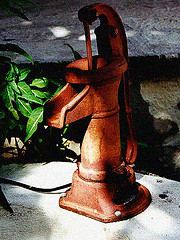 Very.
Very.
And yet this is a place where writers from all genres agree to disagree, as was the case today on AAMBC Radio where the topic was, “How Important is Editing?”
I encourage all writers and novices of the craft to listen to or download the broadcast.
http://www.blogtalkradio.com/AAMBC/2009/05/02/Panel-Discussion-How-important-is-Editing
It would seem that quality editing is not a problem for traditionally published books. Please be sure it is.
Should you think differently look around and open your eyes to all the editors recently and during the past several years released from their jobs at major publishing houses.
They abound. And their advertisements offering services of their expertise in the field of writing fill the back pages of writing magazines such as Writer’s Digest, The Writer and Poets and Writers.
But how does a writer or would-be author choose a good editor?
Clearly finding one is not the problem.
Gut instinct and experience tell me that finding a good editor for your writing is much like finding a good psychotherapist for your heart and soul. You have to be in the write place and your heart and mind need to be too.
You need to have the best of intentions for your work, not impatience and the need for celebrity status and attention as the driving forces behind your decision to write a book and launch your story to the world.
Ambition is not a bad thing. Yet it is only truly gained by setting one’s self on the task of creating and delivering the best product possible, achieving your personal best.
In a culture where time and patience with things that require time to develop are not considered a virtue, are rather considered later bloomers, as opposed to people who choose to apprentice and learned the essence of their craft, writers and would-be authors, even first and second-time published authors cannot afford to allow the conventional wisdom, if it can be called that, to direct the long-term goals for their writing career.
The advancements of the digital age and the internet have made it possible for just about anyone to write a book and bring it to print in either physical form as with a hardcover or paperback book, or on the computer or cell phone screen.
It is our misfortune, as writers in America, that too many celebrated authors make writing a novel or short stories look appear an easy task. Yet success at anything comes with a struggle, a jihad of the most intense and personal kind, the one and true jihad—the fight with one’s self to do what is right and just to our conscience no matter the external context or circumstances.
No technological advancement can go inside one’s mind and deliver imagination. Nor can they endow one with the perseverance to keep refining and revising what the beliefs and fears of their heart deliver in stories.
Ultimately every artist of any medium must dedicate her or himself to doing the best work possible with each creation they undertake. And then they must follow through.
Writers must learn to write, study the craft of putting words together to make sentences, phrases and paragraphs that paint scenes, which constitute chapters and render a book.
It behooves one to apprentice in the area of writing before seeking out an editor. The editor neither a story nor writer make. Only we ourselves, through dedication, heartache, turmoil and burning the light throughout many a night, can accomplish that. And still more awaits our learning and application.
Einstein dedicated 8 years to learning the math required to understand the Theory of Relativity, delivered by the universe or gods in a dream. I recall this when growing impatient with myself, and the time it takes to improve and refine my writing and my stories.
Another genius in her own right, Toni Morrison who was also an experienced literary editor, spent 7 years writing Beloved.
Like the protagonists of the novels we love we must dedicate ourselves to undergoing the transformation of becoming not simply a recorder of words and thoughts, but artist with words and form.
The best things require time and commitment.
All good things come those who wait, and persist.
How long have you persisted?
What is your limit for watching and waiting to see your words and stories in print?

I have been working on my story for about 2 years now, one year was spent with the characters living in my mind ad I got to know them and their stories. Last year, I started actually writing the story.
As a newbie to the writing game, I’ve learned that it will take time for me the get my draft polished to the reflect the tone, character, and emotion I am going for. It took me a while to come to this conclusion as I was operating on the delusion that my first draft would come out in ‘ready for publication’ condition.
So after about 6 months of start/stop, and now about 5 months of continuos writing, I am pleased with my progress, yet I know that I am in for hours and hours of rewrites to get my story to the level I want it to be.
I think all of us fall prey to thinking that if we can just get the words on paper the story will write itself. This is partly true. Getting that first draft down on paper is extremely crucial. Without that you have nothing to edit or revise, no raw matter with which to work.
The true writing of any work of fiction is in the editing and revision. And that takes time, teasing out each sentence and paragraph in the effort of uncovering the story within the story.
I don’t know how many times I’ve started out writing a story with one thing in mind. And then on finishing that first and rough draft my eyes open to another story. And then on successive revisions I find more and more stories, all within that first idea. These are not major changes, rather more subtle ones, but with magnificent bearing.
These ah-ha moments are what I write to experience. Without them, I know the story is not progressing. And neither will the words I pen how a reader’s attention.
This is why I cannot understand how some writers churn out 2 and 3 books a year. They must have ghost writers. Maybe again, this is why books are not selling. There’s nothing new and fresh to hold the reader’s attention. The creative muse does not work on a clock, rather it exists in its own dimension. So much of our work as writers is finding a way a routine that allows us to maintain our practical responsibilities to our families and ourselves, and enter the muse’s space so that we may write.
That for me is tall task leaving little time for anything else.
Thanks again for your comment and good luck with your story.